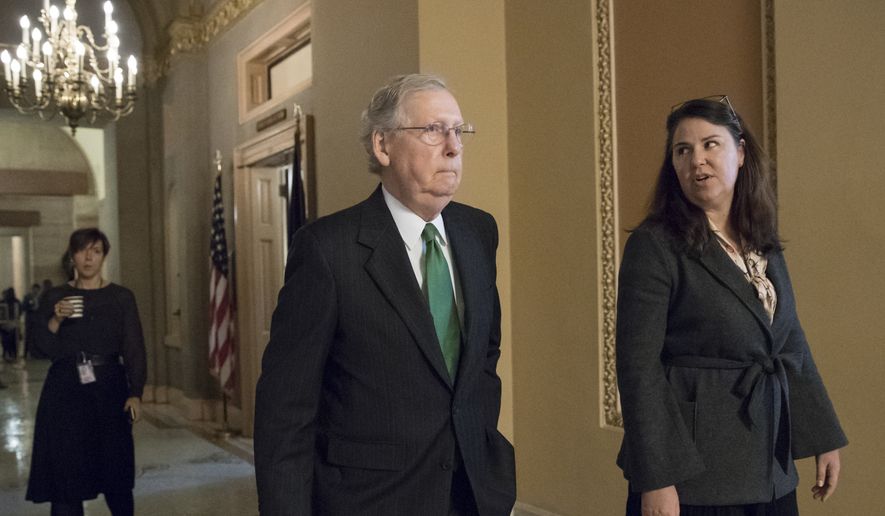Senate Republicans’ 2018 budget plan survived an initial test vote Tuesday, but sniping between deficit and defense hawks leaves GOP leaders with a narrow margin for error as they look for final passage later this week, hoping to clear a path for their tax overhaul plans.
The budget sets discretionary spending levels for the new fiscal year at about $1 trillion, and projects a deficit of $641 billion.
More importantly to Republicans, the budget unlocks fast-track procedures that would allow the GOP to pass a tax reform plan on a majority vote, meaning they can avoid a Democratic filibuster. It also carves out enough budget space to allow for $1.5 trillion in new deficits from tax cuts associated with the reform.
“No one should be confused about this: That a vote for the budget is a vote for tax reform,” said Senate Majority Whip John Cornyn, Texas Republican. “Conversely, a vote against the budget is a vote against tax reform.”
The 50-47 vote broke along party lines, though final passage later this week will not be so easy for the GOP, who cannot rely on any Democrats for support, and who are facing an internal battle that pits deficit watchers against Pentagon-backers.
Sen. Rand Paul of Kentucky accused Sens. John McCain and Lindsey Graham of pushing for a budget that busts the defense spending caps set by the 2011 Budget Control Act.
The senators “basically, are just not fiscally conservative, they want unlimited spending, and they want to do anything they can to exceed the budget caps,” Mr. Paul said on a conference call with reporters.
Mr. McCain, who chairs the Senate Armed Services Committee, and other defense hawks like Mr. Graham have insisted on higher spending levels for defense than what’s been outlined in the Senate plan.
Mr. McCain said Tuesday that more service members are now dying because of a lack of military readiness and training than they are in combat.
“I don’t think that defending the nation should be dependent on [the] deficit,” he said. “I think it’s our first priority.”
Both Mr. McCain and Mr. Graham on Tuesday said they plan to vote for the budget, with Mr. Graham saying it’s key to moving the ball forward on tax reform.
“I’m a hundred percent yes,” Mr. Graham said. “If you don’t vote for this budget resolution, you can’t cut taxes. It’s that simple.”
Mr. Graham said he’s all for more defense spending, but that’s a debate that will come during the appropriations process.
Mr. Graham also said Mr. Paul was misleading the public with his deficit complaints. He said the budget does adhere to the 2011 budget caps, though it leaves room for special one-time war spending. Lawmakers have used that war spending in the past as an end-run around the caps.
“You’re talking about a technicality,” Mr. Paul said. “If you don’t care that you’re going to exceed the caps, you just call it something different.”
Mr. McCain questioned Mr. Paul’s relevance to the debate.
“I don’t know anybody who pays any attention to him,” the Arizona Republican said.
The defense spending debate notwithstanding, GOP leaders say Republicans are more unified on their push to overhaul the tax code than they were during the failed Obamacare repeal effort. They also say they’re aware another high-profile debacle could cost them in next year’s midterm elections.
Sen. John Kennedy, Louisiana Republican, said some compromises might be in order to get legislation across the finish line.
“In Louisiana, when you get 90 percent of something you like, that’s generally considered to be better than zero percent,” he said. “That may be different in other states.”
“But we need to go pass tax reform. And there is no way to construct a bill or a budget resolution that makes every member of the United States Congress completely fall in love with it,” he said. “That’s not reality.”
Democrats, meanwhile, have shown little interest in compromising on Republicans’ budget and tax plans, which they say represent massive giveaways to the wealthy at the expense of the poor and the middle class.
“I believe, and the people on our side believe, that the budget being brought forth is one of the most unfair and destructive budgets ever proposed in the modern history of this country,” said Sen. Bernard Sanders, an independent who serves as ranking member on the Senate Budget Committee.
• David Sherfinski can be reached at dsherfinski@washingtontimes.com.




Please read our comment policy before commenting.